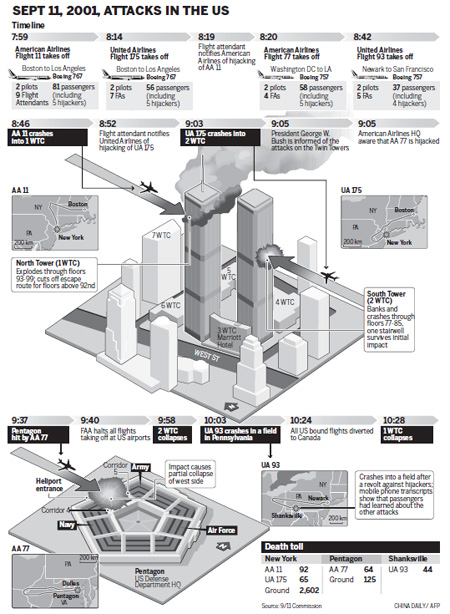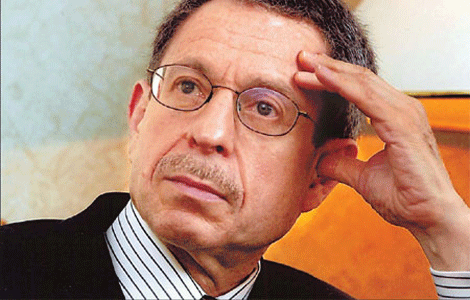US still vulnerable to terror attacks
Updated: 2011-09-09 07:55
By Zhang Yuwei and Tan Yingzi (China Daily)
|
|||||||||

|
The design sketch of the rebuilt World Trade Center was revealed in New York on Wednesday. Xinhua News Agency |
Threat remains despite security upgrades by Bush and Obama administrations and bin Laden's death
NEW YORK / WASHINGTON - Ten years ago, the most devastating terrorist attacks to ever hit the United States claimed the lives of more than 3,000 innocent people.
But a decade after the US government made counterterrorism a top priority, including former president George W. Bush's "War on Terror" and President Barack Obama's "National Strategy for Counterterrorism", an important question remains: Is the US indeed a safer place now?
The answer, according to experts, is not as black-and-white as people might think.
"We are in a world that is probably just about as safe and unsafe as it was before the attacks on 9/11," said Richard Barrett, a terrorism expert who heads the United Nations Security Council's al-Qaida and Taliban monitoring team in New York.
"I think in some ways we do (believe we live in a safer world), but in some ways we still think there is a bit of a threat out there," he said.
Since Sept 11, 2001, at least 40 terrorist plots aimed at the US have been thwarted with the number of successful terrorist attacks against US targets worldwide on the decline since 2005, according to the latest report on US counterterrorism strategy by the Heritage Foundation in Washington, DC.
"Yes, we are safer now," said James Jay Carafano, a security expert at the conservative think tank and the report's leading author.
"Generally, we have done a pretty good job," Carafano said, adding the country is still facing the threat of global terrorism, especially from state-sponsored groups from Iran and Mexico.
Carafano said the progress against al-Qaida's attempts to attack the US was the result of taking the offensive in the battle against terrorism, including disrupting how terrorists travel, communicate and raise funds. Significant improvements in border security have also helped. Counterterrorism also brought solidarity from countries around the world. In 2006, the UN General Assembly for the first time unanimously adopted a global counterterrorism strategy.
"On counterterrorism, there has been a fundamental understanding that one has to work with its partners, either through the UN or in another forum," Barrett said.
The US support of other countries in beefing up counterterrorism efforts has been much more collaborative than its foreign policies in other areas, he added.
Carafano said so far international cooperation in counterterrorism has been very effective, including joint efforts between China and the US.
According to a recent Gallup survey, the number of Americans who still fear that a terrorist attack in the US is imminent has waned since al-Qaida leader Osama bin Laden was killed in May. The survey found that the fear is now on the "low end" of the range seen over the past decade.
Barrett said that although counterterrorism measures have been successful, the problem with the battle against terrorism is that in many ways "counterterrorism measures increase people's anxiety, and they tend to create fears for communities rather than secure ones."
"Within the US, there is a need for counterterrorism to be brought back to balance," Barrett said.
Stephen Biddle, a senior fellow at the Council on Foreign Relations, made similar arguments.
"While we can contain terrorism, we can't afford the costs of trying to eliminate it and will have to learn how to live with the chronic threat of low-level attacks," Biddle said in a commentary on the council's website.
To meet the new challenges, Obama unveiled his counterterrorism strategy in June that will seek to treat terrorism under a law enforcement paradigm and lessen the US footprint overseas. The administration has also declared its intent to withdraw combat forces from Iraq and Afghanistan, pursue cuts in conventional forces and use more diplomacy instead of military intervention.
The report, however, says that Obama's strategy will fail because it cedes the initiative to America's enemies and provides them with the chance to reconstitute "both their moral and physical assets".
The administration does not pay enough attention to state-sponsored terrorism, "which will increasingly be a major force to be reckoned with", the report added.
The US should be persistent in its counterterrorism strategy, the report said, and its primary goal should be to prevent the emergence of a "global Islamist insurgency" through the use of military power and strong cooperation between the US and other countries.
US military policies during the past decade, however, have caused much concern among Americans.
New data released by the Pew Research Center showed that only about a quarter of the people who were surveyed said the wars in Iraq and Afghanistan have lessened the chances of terrorist attacks in the US. In both cases, majorities say the wars either have increased the risk of terrorism in the US or made no difference.
"Initial US successes in Afghanistan and Pakistan after 9/11 masked deeper problems that have beset Washington's effort to stabilize the 'AfPak' theater," Daniel Markey, a senior fellow at the website of the Council on Foreign Relations, wrote in a commentary on the council's website.
Barrett said "everyone is interested in having increased peace, stability and security in Afghanistan and Pakistan".
"If there is any country in the world that is under threat from terrorism, it's Pakistan. In Pakistan, the impact of terrorism is much more significant and severe, particularly if it causes tensions between Pakistan and India."
China Daily













